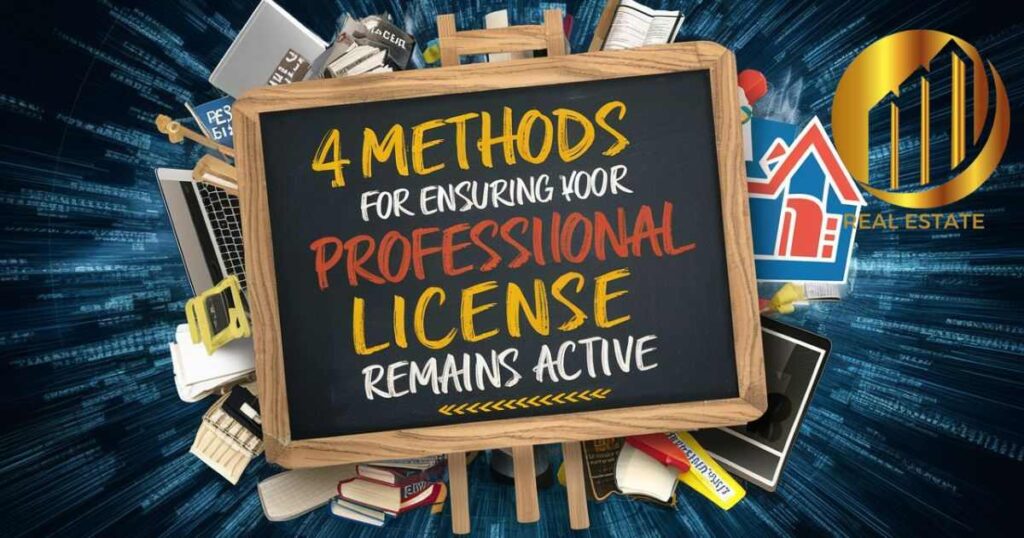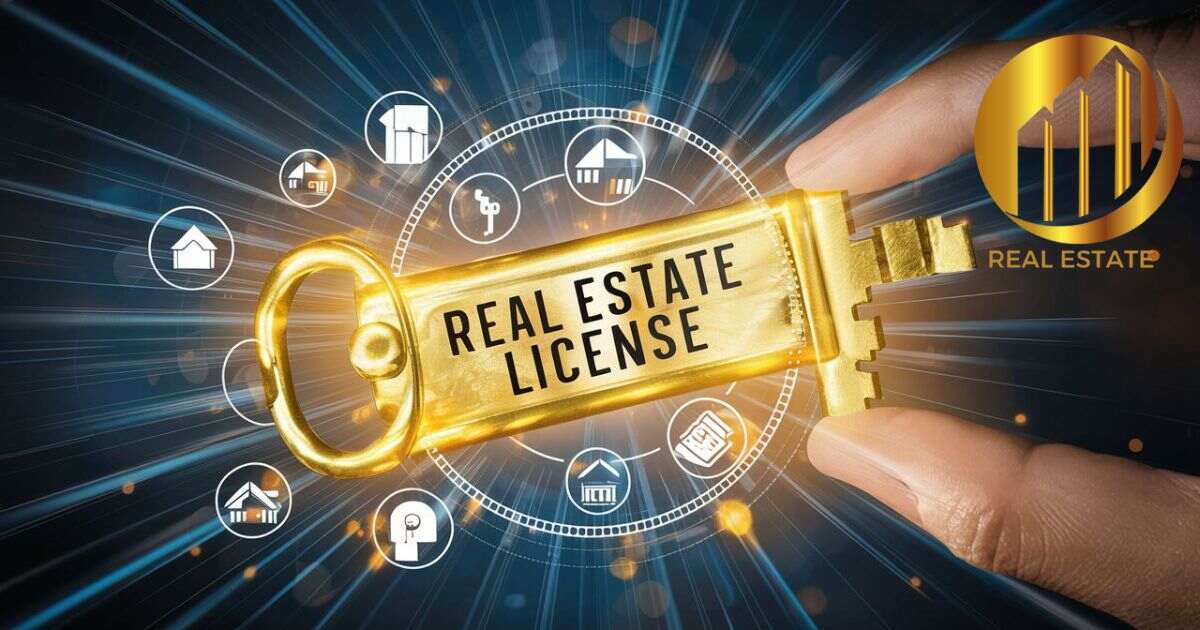A license in land alludes to an expert or business substance that holds a permit to take part in different exercises connected with the land business. This incorporates filling in as a realtor or dealer, working with land exchanges, and addressing clients in trading properties. In this complete article, we will investigate the job of a license in the land, the various sorts of licenses, their obligations, and the necessities to become one.
Key Points for Real Estate License in Steps
| Step | Key Point | Description |
| 1 | Education Requirements | Complete the required real estate pre-licensing courses, which vary by state. Typically, these cover essential topics like contracts, property law, and ethics. |
| 2 | State Licensing Exam | Pass the state-administered real estate licensing exam. This test assesses your understanding of real estate principles, laws, and practices. |
| 3 | Application Submission | Submit a license application to the state real estate board or regulatory agency. Include all necessary documentation, such as proof of education and exam results. |
| 4 | Background Check and Fees | Undergo a background check, and pay the required licensing fees. Clear criminal and financial history is typically necessary for approval. |
| 5 | Continuing Education | Stay current with real estate industry trends and regulations by completing ongoing continuing education requirements. This ensures a valid and active license. |
Land License: Basic Definition and Outline

A land license is an individual or substance that has gotten lawful consent, as a permit, to lead land exercises. These are known as real estate agents or developers. And play a key role in buying, selling, leasing, and appraising real estate.
They go as ambassadors between buyers and sellers, helping clients navigate complex exchange land, and guaranteeing conformity to physical laws and guidelines.
Land Permit Types: Intermediary, Partner Representative, And Real Estate Professional

As it happens a few kinds of land permits exist, each with unmistakable obligations and capabilities. How about we investigate the primary classes:
1. Land Sales Representative
A land sales rep is an individual (self-employed entity) who has finished the expected instruction, breezed through a permitting test, and holds a functioning permit to rehearse land under the management of an authorized dealer or partner specialist. Commonly, salespersons work under the umbrella of a land organization or financier.
2. Partner Representative
A partner dealer is an authorized realtor who has satisfied extra instruction and experience necessities past those of a sales rep. Partner intermediaries can work freely or under the oversight of an overseeing specialist, and they may likewise direct salespersons inside the financier.
3. Authorized Representative
An authorized dealer is an accomplished realtor who has met explicit instruction, experience, and assessment standards to get an intermediary’s permit. Merchants have the power to work their land firm, oversee salespersons and partner handles, and give business administrations to clients.
The Main 5 Obligations of A Land License

Land licenses have different obligations and obligations while addressing clients in land exchanges. Some of their principal obligations consist of:
1. Addressing Purchasers or Dealers: Licenses can go about as either a purchaser’s representative or a vendor’s representative (posting specialist), addressing the interests of their separate clients in discussions, property appearances, and all through the whole exchange process.
2. Giving Posting Administrations: Licenses as posting specialists help landowners advertise and post their properties available to be purchased or rented. They lead market investigations, work with dealings with possible purchasers, and assist vendors with getting ideal terms.
3. Introducing Offers: Licenses must introduce offers and counteroffers among purchasers and merchants immediately. They work with viable correspondence, guaranteeing that all gatherings are educated and engaged with the exchange interaction.
4. Maintaining Trustee Obligations: Licenses owe guardian obligations to their clients, which incorporate dependability, secrecy, responsibility, dutifulness, and exposure. They should act to the greatest advantage of their clients while keeping up with genuineness and honesty all through the exchange.
Instructions to Turn into a Land Licenses: 5 Moves Toward Progress

To turn into a land licenses people should meet explicit prerequisites set by their particular state or ward. Albeit the necessities can change, the general advances and rules are as per the following:
1. Meeting Age and Training Prerequisites: Candidates should for the most part be no less than 18 or 19 years of age and have a secondary school recognition or same. A few states might have extra instruction requirements.
2. Finishing Pre-Permit Training: Imminent licenses should finish several long periods of pre-permit instruction. These courses commonly cover themes like land standards, contracts, morals, money, and property for the executives. The reason for this instruction is to furnish hopeful licenses with a strong underpinning of information and comprehension of the land business.
3. Finishing the Permitting Test: In the wake of finishing the required pre-permit training, people should breeze through an authorizing test regulated by their state’s land bonus. The test normally comprises both a public piece and a state-explicit part. It tests candidates on their insight into land regulations, guidelines, and practices
4. Presenting an Application: When the permitting test is effectively passed, candidates should present a permit application to the suitable administrative body. Alongside the application, they should give the necessary documentation, which might incorporate confirmation of schooling, historical verifications, unique finger impression cards, and installment of utilization expenses.
5. Getting a Permit: Upon endorsement of the application, candidates are given a land sales rep permit or a specialist permit, contingent upon their capabilities. The permit will incorporate a special permit number that the license should remember for all promoting and correspondence connected with their land administrations.
4 Methods for Guaranteeing Your Expert Permit Stays Dynamic

After getting a land permit, licenses should satisfy specific prerequisites to keep a functioning permit. These necessities might include:
1. Proceeding with Training: Licenses are regularly expected to finish a predefined number of preceding schooling hours during each permit recharging period. This guarantees that licenses stay refreshed on industry patterns, changes parents in law and guidelines, and best practices in the field.
2. Recharging the Permit: Licenses have termination dates, and licenses should restore their licenses occasionally. This includes presenting a reestablishment application and paying the vital charges before the termination date. The inability to reestablish on time might bring about the permit becoming idle or terminated.
3. Sticking to Moral Norms: Licenses should stick to an overarching set of rules set by proficient land affiliations and state administrative bodies. This code expects licenses to act genuinely, keep up with privacy, and maintain the best expectations of trustworthiness in their strategic policies.
4. Revealing Permit Status: Licenses are ordinarily expected to remember their permit number and contact data for all publicizing materials, for example, business cards, websites, and promotional materials. This guarantees transparency and permits the overall population to verify their licensing status. This requirement extends to professionals in various fields, including real estate license holders, ensuring accountability and clarity in their interactions with the public.
The Legitimate Results of License Unfortunate Behavior
Land licenses are supposed to act expertly and morally. Taking part in exploitative or criminal operations can bring about disciplinary activity by the state administrative body. Outcomes might incorporate fines, permit suspension or denial, and other legitimate punishments. Licenses should likewise know about their guardian obligations to their clients. Breaking these obligations or participating in false exercises can prompt legitimate activity, claims, and extreme harm to their expert standing.
FAQ’s
What are the Requirements to Become a Real Estate Agent in the US?
Requirements to become a real estate agent in the US typically include completing pre-licensing education, passing a state exam, and obtaining sponsorship by a licensed broker.
What is the Difference Between a Real Estate Agent and a Real Estate Broker?
A real estate agent is licensed to represent buyers and sellers in real estate transactions, while a broker can own a real estate brokerage and supervise agents.
What is the Process for Obtaining a Real Estate License in California?
To obtain a real estate license in California, complete pre-licensing courses, pass the state exam and apply for licensure with the California Department of Real Estate.
Conclusion
A license in land assumes a fundamental part in working with property exchanges, addressing clients, and giving business administrations. Whether as land salespersons, partner facilitates, or authorized merchants, these experts bring skill, information, and direction to the purchasing, selling, and renting genuine property.
To turn into a license, people should meet explicit instruction, assessment, and application prerequisites. They should likewise keep a functioning permit by proceeding with schooling prerequisites, sticking to moral principles, and restoring their licenses on time.
By maintaining their obligations and deliberately maintaining honesty, licenses add to the smooth activity and development of the land business. They act as believed consultants to clients, assisting them with exploring the intricacies of land exchanges while guaranteeing consistency with regulations and guidelines.











